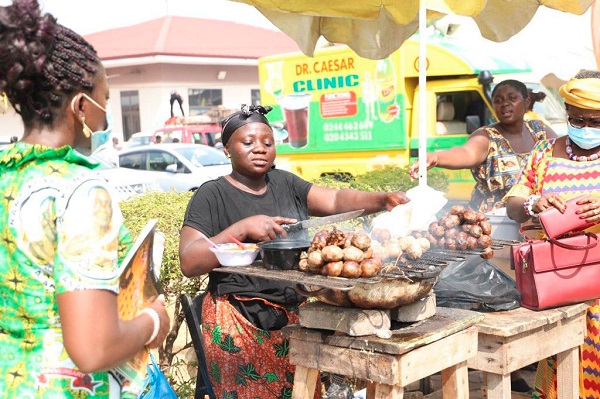‘BOSOA’ is a delicacy that one can easily buy from mostly people who roast meat to sell, usually along major streets.
It is very common along the street of the Kumasi Abattoir, popularly known as ‘Manyanka’, not too far from Brewery Junction, on one’s way to Kaase.
The sellers, who are only males, have taken advantage of the nearby slaughter house and always have enough meat available to sell to buyers.
Bosoa is a delicacy made of offal or the intestines of either a cow, sheep or goat.
Once the meat is spiced and half boiled, it is inserted into an offal of either beef or mutton, and finally grilled with charcoal.
Just like khebab, it is served with powdered pepper and sliced onions to taste if requested by the buyer.
Manhyia delicacy
Unlike most of the roast meat traders mostly referred to as ‘Abokye’, who sell all kinds of meat at their stands, those at the Manhyia Palace are predominantly into the selling of Bosoa.
At the Manhyia Palace, the sale of Bosoa is a female dominated one, unlike that of Manyanka.
One would assume that Bosoa is a prescribed and traditionally accepted meat within the palace, but in reality, it’s just a favourite ‘take away’ dish for most residents in Kumasi.
Aside the numerous food joints within the premises, many prefer Bosoa, since one can easily enjoy the delicacy by just using a tooth pick, and not necessarily having to sit or even wash their hands before enjoying it.
During festivals such as Akwasidae, Awukudae and Adaekese, Bosoa is the most sought-after meal for the numerous celebrants who visit the Manhyia Palace.
Garnished and just like the size of doughnuts, one can get two pieces of Bosoa for GH¢10.
Economic value
A 55-year-old woman, Maama Akosua Pokuwaa, who said she had been engaged in the trade for the past two decades, told this reporter, she inherited it from her late mother.
“There has not been a single day that my Bosoa has not run out. In fact, but for this trade, I don’t know how I would have been able to see my two daughters through university,” she told the Daily Graphic.
Yaa Serwaa, another Bosoa seller at the Manhyia Palace, said although she could count as many as 10 competitors, business has always been good.
“You just imagine the number of the traditional people and visitors who come to this Palace every day,” she said.
A traditional leader at the Palace, who spoke on condition of anonymity, told this reporter, “Bosoa has always been a delicacy in this Palace since time immemorial.
“Bosoa is more or less a traditional meal to many of us,” he explained, adding that considering the targeted customers- the traditional community and visitors - sellers had no option than to prepare it under hygienic condition.

